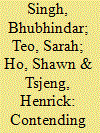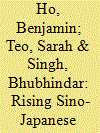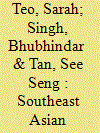|
|
|
Sort Order |
|
|
|
Items / Page
|
|
|
|
|
|
|
| Srl | Item |
| 1 |
ID:
174787


|
|
|
|
|
| Summary/Abstract |
This article challenges the simplistic view that U.S. leadership in East Asia is weakening relative to China’s increasing ability to shape the regional order, which will force other states to choose between these two powers. Based on interviews with political elites, analysts, and academics in the United States, China, Japan, and Indonesia, we argue that the East Asian order transition is more complex and nuanced, especially when we examine views toward: (1) the Sino–U.S. rivalry for regional leadership; (2) whether Chinese initiatives such as the Asian Infrastructure Investment Bank and the Belt and Road Initiative disrupt the current order; and (3) the preferred vision of regional order for each of the four countries. While there is hardly a consensus view about issues of regional order, it appears that in the short to medium term, China is not expected to substantially overhaul the existing East Asian order. Nevertheless, Beijing is likely to chip away at U.S. regional leadership and, in the long term, would presumably seek to create an order that would sustain its rise and maintain its regional preponderance. The responses of other regional stakeholders toward these developments would be vital in shaping the collective impact on the East Asian order.
|
|
|
|
|
|
|
|
|
|
|
|
|
|
|
|
| 2 |
ID:
157815


|
|
|
|
|
| Summary/Abstract |
This paper explores the middle power identities of Australia and South Korea during the Kevin Rudd/Julia Gillard (2007–2013) and Lee Myung-bak (2008–2013) administrations. Considering the problems in the existing position, behaviour, impact and identity-based definitions of middle powers, examining how self-identified middle powers have constructed such an identity would offer useful insights into the middle power concept. Relying on a framework that captures an identity's content and contestation, this paper argues that while Australia and South Korea have assumed a middle power identity, their visualisations of this identity are slightly different. Australia has understood its middle power identity in both economic and security terms, whereas South Korea appears to have connected such an identity more with the economic dimension. These differences affect how they envision their respective middle power roles in international affairs.
|
|
|
|
|
|
|
|
|
|
|
|
|
|
|
|
| 3 |
ID:
187401


|
|
|
|
|
| Summary/Abstract |
This paper argues that amid intensifying Sino-U.S. rivalry, middle powers in East Asia have contributed towards regional peaceful change through the exercise of good regional citizenship, a concept which draws on and modifies from the more commonly known good international citizenship which is closely associated with middle powers. Specifically, good regional citizenship involves proactively strengthening inclusive multilateralism, enhancing the rules-based order, and contributing to bridging efforts in East Asia. The paper examines the good regional citizenship of two middle powers, namely Australia and Indonesia. It finds that while both countries have exercised good regional citizenship, their specific strategies or the outcomes of their initiatives on regional dynamics have varied as a result of their relations with the respective major powers and their general foreign policy approaches. Australia’s good regional citizenship has supported the preservation of U.S. leadership in East Asia vis-à-vis the rise of other regional powers, while Indonesia’s good regional citizenship has helped to narrow the gaps among regional actors through mechanisms led by the Association of Southeast Asian Nations (ASEAN).
|
|
|
|
|
|
|
|
|
|
|
|
|
|
|
|
| 4 |
ID:
137780


|
|
|
|
|
| Summary/Abstract |
This paper seeks to enrich understandings of middle-power security strategies by examining countries that lack great-power capabilities but still aim to influence the regional security environment. Based on a literature review highlighting the functional and behavioral approaches of middle power diplomacy, we note that these elements could also apply to their regional security strategies. The paper focuses on regional security strategy as a subset of foreign policy and asks why some middle powers appear to go for a regional security strategy that is more functional while others adopt a strategy that is more behavioral. It argues that this divergence derives primarily from differences in resource availability and strategic environment. An analysis of Indonesia, South Korea, Australia and Vietnam highlights how each of these middle powers has adopted a particular regional security strategy, driven by their resource availability and strategic environment.
|
|
|
|
|
|
|
|
|
|
|
|
|
|
|
|
| 5 |
ID:
151992


|
|
|
|
|
| Summary/Abstract |
One of the biggest challenges for the East Asian region today is the Sino-Japanese relationship. Starting with the fishing trawler incident in September 2010, followed by Japan's nationalisation of the Senkaku/Diaoyu Islands, this relationship is experiencing an escalation of tensions in most, if not all, areas of the bilateral relationship. In response to the intensifying competition, China and Japan have elevated the importance of South-East Asia and the Association of Southeast Asian Nations (ASEAN) in their foreign policy strategies. Focusing on how elites from five South-East Asian states—Indonesia, Malaysia, the Philippines, Singapore and Vietnam—perceive the engagement of China and Japan with the region, this article poses two questions: (1) How do South-East Asian elites view the Sino-Japanese competition? and (2) How do South-East Asian elites view the role of ASEAN in managing the competition? The analysis here concludes that while some South-East Asian elites see opportunities in the Sino-Japanese competition, they nevertheless do not perceive it as an issue of critical significance. Instead, the concern lies generally with major-power dynamics, and particularly with Sino-US relations. ASEAN is viewed to lack the ability to manage the negative consequences of the Sino-Japanese competition, although its external balancing function has perceptibly helped to restrain any escalation of major-power tensions.
|
|
|
|
|
|
|
|
|
|
|
|
|
|
|
|
| 6 |
ID:
145688


|
|
|
|
|
| Summary/Abstract |
Perspectives from Indonesia, Malaysia, the Philippines, Singapore and Vietnam show that South Korea’s middle power role in Southeast Asia is confined to economics and capacity building. Despite being absent from Southeast Asia’s geostrategic calculus, Korea’s non-revisionist inclination is seen to be advantageous in its pursuit of enhanced middle power status.
|
|
|
|
|
|
|
|
|
|
|
|
|
|
|
|
|
|
|
|
|